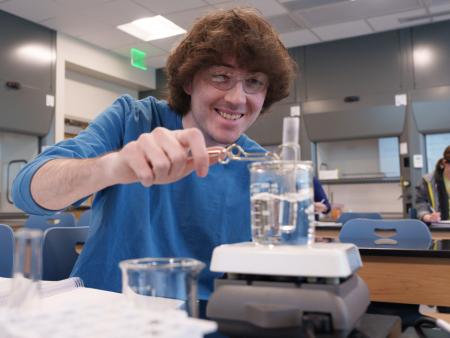Chemistry
Getting your Associate of Science degree in Chemistry will give you the flexibility to find a career in a variety of fields. Chemistry is all around us and getting your foundation in chemistry will set you up for a career in a wide range of areas. At Arapahoe Community College, we have chemistry courses designed to teach you the skills you need in your future career and prepare you for transfer to a 4-year university.
What You'll Learn
Once you graduate with your AS in Chemistry, you’ll be able to:
- Employ proper lab technique and critical thinking to carry out, record, and analyze data from chemical experiments
- Solve chemistry problems using critical thinking and analytical reasoning
- Use modern instruments to interpret and analyze graphical representations of experimental results
- Write about chemistry topics in a clear and concise manner
CIP 400501 (DCHE)
The purpose of a statewide articulation agreement is to identify the courses a student at a Colorado public community college must complete as part of an AA/AS degree to be guaranteed to be able to complete the designated baccalaureate degree program at public four-year colleges and universities as designated by the Colorado Department of Higher Education (CDHE) transfer agreement.
For more information about this transfer degree please refer to the Colorado Department of Higher Education website.
Admission Requirements
Program Requirements
CCCS Courses Applied to GT Pathways General Education Curriculum (see Notes below)
- GT - Two GT Pathways Arts & Humanities courses (GT-AH1, GT-AH2, GT-AH3, GT-AH4)
- GT - One GT Pathways History course (GT-HI1)
- GT - Two GT Pathways Social & Behavioral Science courses (GT-SS1, GT-SS2, or GT-SS3)
Notes:
1. This statewide transfer articulation agreement in Chemistry does not fulfill requirements for the GT Pathways general education curriculum or the Associate of Science degree prior to transfer; however, this agreement does guarantee a student, if admitted, junior standing and completion of the baccalaureate degree within an additional 60 semester hours at the receiving institution.
2. Completion of the receiving institution's lower division general education requirements is fulfilled only under the condition that one GT Pathways-approved course in arts and humanities (AH1, AH2, AH3, or AH4) and one GT Pathways-approved course in social and behavioral sciences (SS1, SS2, or SS3) are successfully completed at the receiving institution within the first 30 hours or 12 calendar months.
3. Students transferring to a four-year college/university under this Chemistry agreement are encouraged to 'reverse' transfer the one GT Pathways course in arts and humanities and the one GT Pathways course in social and behavioral sciences (Note 2 above) back to their community college in order to complete the GT Pathways general education program and to earn their Associate of Science degree with a Chemistry designation.
4. Lecture and laboratory portions of organic chemistry, CHE 2111 and 2112, must not be taken in an online delivery format.
Graduation Requirements
- Apply for graduation online at www.arapahoe.edu/graduation.
ACC academic plans will help guide you through your chosen program. The academic plan will provide you with important information, like which semesters courses are offered if there are any prerequisites or co-requisites for courses, program outcomes, course sequence recommendations, notes for the program, graduation requirements, and other important information. These are updated annually, so we recommend downloading a copy of yours to keep on track to graduation.

